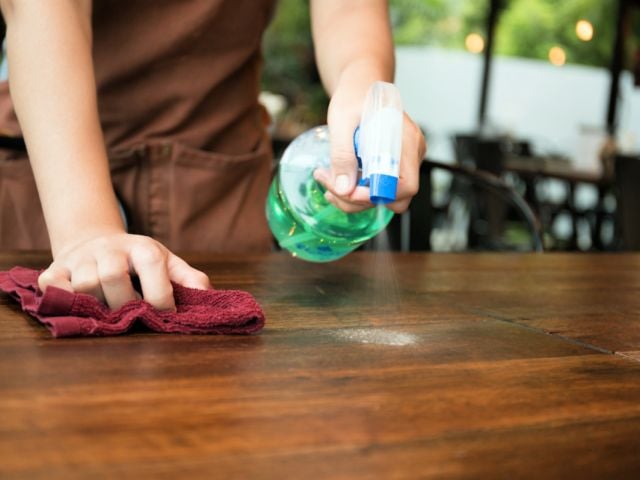SACRAMENTO, Calif. – State Sen. Ricardo Lara, D-Bell Gardens, introduced legislation today to require manufacturers to disclose the ingredients in cleaning products used by consumers and professional cleaning workers. If the bill passes, it would be the first such law to take effect in the nation.
The Cleaning Product Right to Know Act calls for manufacturers to disclose the product’s ingredients and contaminants of concern, in order of concentration – including the chemicals used in fragrance mixtures – both on the product label and online. It is co-sponsored by the Environmental Working Group, the Breast Cancer Fund and Women’s Voices for the Earth.
“We trust Californians to check the labels on food, drugs and cosmetics, but you have to be a chemist to know what is in the cleaning products that are under your kitchen sink,” said Lara. “The Cleaning Product Right to Know Act will require companies to come clean about their ingredients so California consumers and domestic workers have the right to know what they are buying and using, and can make informed choices.”
Bill Allayaud, California director of government affairs for EWG, said that despite growing consumer demand and some movement by the industry, transparency about what’s in cleaning products is still lacking.
“It’s time to end the secrecy about ingredients in cleaning products,” said Allayaud. “Senator Lara’s legislation gives shoppers the power to make informed buying choices for themselves and their families.”
In an unprecedented leap in transparency, Unilever announced yesterday it will provide detailed information on fragrance ingredients for all personal care products in its multi-billion-dollar portfolio. But most companies resist calls for disclosure and use the term “fragrance” to hide hundreds of chemicals, including known allergens.
SB258 would require disclosure of all ingredients in cleaning products, but would not require companies to reveal the concentrations of ingredients, or how the product is formulated and processed.
“We use cleaning products to remove dirt and grime, but many products leave behind harmful chemicals, including some ingredients linked to breast cancer,” said Nancy Buermeyer, senior policy strategist for the Breast Cancer Fund. “We all deserve to know what’s in our products so we can make educated decisions about what’s safest for ourselves and our families. SB258 provides clear cut rules on how all ingredients should be listed on cleaning products, fulfilling a rallying demand and need for consumers, workers and companies across the state.”
Even cleaning products advertised as “green” or “natural” may contain ingredients that can cause health problems. Manufacturers can use almost any ingredient they choose, including known carcinogens and substances known to pose health or environmental hazards.
“Women are still doing the majority of housework, and those employed in the housekeeping industry are predominately women,” said Jamie McConnell, director of programs and policy for Women's Voices for the Earth. “As a result, women bear the burden of exposure to harmful chemicals in cleaning products that can cause birth defects, asthma, infertility and even cancer. Studies have shown that toxic chemicals from cleaning products can be found in urine, breast milk and blood – including the umbilical cord blood of newborns. Senator Lara’s bill will give women the power to avoid harmful chemicals that may impact their health.”
Many manufacturers of cleaners make it difficult, if not impossible, for consumers to learn what ingredients are in products. Manufacturers don't want shoppers to know that their products contain chemicals that can cause reproductive problems, exacerbate asthma, burn or irritate skin, and harm the environment.
“It’s past time that California consumers have the vital information they need to make informed choices in the marketplace,” said Kathryn Alcantar, California policy director for the Center for Environmental Health. “For more than 20 years, CEH’s work to enforce product warning laws has led to business innovations for safer products for children and families in California and throughout the country. With this bill, California will deepen its leadership in encouraging the most cutting-edge business practices to meet the global demand for safer products made without harmful chemicals.”
“Too often, the invisible workforce that cleans our offices and public spaces is treated as expendable, and their health and lives are disregarded,” said David Huerta, president of the SEIU United Service Workers West. “They are put in harm's way without a word of caution or a second thought. Senator Lara's bill takes a crucial step toward correcting this problem.”
“We applaud Senator Lara taking leadership on this important issue for our membership base – domestic workers and day laborers in Los Angeles,” said Maegan Ortiz, executive director of the Instituto de Educacion Popular del Sur de California (IDEPSCA). “This bill represents a step forward in a long-term struggle to ensure that companies that manufacture toxic chemicals used by low-income workers, like domestic workers on the job and at home, can be held accountable for long-term damage their products cause.”
"An educated consumer is an empowered consumer, and that shouldn't be limited by language access or literacy,” Ortiz added.
“My children come first and I don’t want them exposed to toxic chemicals,” said Noemi Cruz, member of EJ Committee and Mujeres en Action. “I know to read product labels and now other people will soon learn what toxic ingredients are in the cleaners they use. Kids and teens will see the chemicals in the products they use at home and search for health hazards on the internet. They’ll share this information with their families. For now, we can shed light on toxics until we can fully eliminate them from products!”
SB258 is a crucial first step toward safer cleaning products in the marketplace. Rather than disclose ingredients that raise health concerns, some companies will likely reformulate their products and improve safety.
# # #
The Breast Cancer Fund is the leading national organization working to prevent breast cancer by eliminating exposures to toxic chemicals and radiation linked to the disease. Learn more at www.breastcancerfund.org.
EWG is a nonprofit, nonpartisan organization dedicated to protecting human health and the environment. Its mission is to empower people to live healthier lives in a healthier environment. Learn more at www.ewg.org.
Women’s Voices for the Earth is a national environmental health organization that works to amplify women’s voices to eliminate toxic chemicals that harm our health and communities. Learn more at womensvoices.org.
Areas of Focus
Disqus Comments



